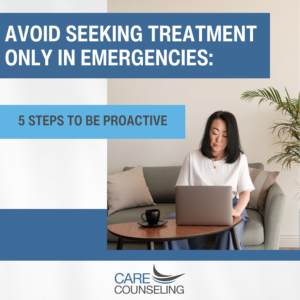Avoid Seeking Treatment Only in Emergencies: 5 Steps to Be Proactive
 Many people I know don’t like to go to the doctor. Going to the doctor often means that there is something “wrong”, or you are trying to figure out what is wrong. Due to the fear of the unknown, some people choose to avoid learning about something they do not want to have to address. When you do go to the doctor, the process can be tiring if you are waiting on lab work, medical scans, referrals to specialty providers, and follow-up visits.
Many people I know don’t like to go to the doctor. Going to the doctor often means that there is something “wrong”, or you are trying to figure out what is wrong. Due to the fear of the unknown, some people choose to avoid learning about something they do not want to have to address. When you do go to the doctor, the process can be tiring if you are waiting on lab work, medical scans, referrals to specialty providers, and follow-up visits.
On the other hand, I also know people who enjoy seeing their doctors and have had very positive experiences in healthcare. Learning about one’s medical history, screening out medical and mental health concerns, having the opportunity to ask questions, and getting routine physicals can help provide peace, comfort, and validation to areas of concern. When there are issues that require medical intervention, having a trained professional and a supportive care team makes a big difference.
One’s experiences (and sometimes opinions based on others’ experiences) are often associated with how healthcare is viewed and one’s response to seeking treatment.
If you find yourself avoiding visits, except for urgent medical matters, then your experience is going to be very different, depending on the situation. Preventative care medical visits are different than an urgent care visit, or a trip to the emergency room. You’ll also likely see a big difference in cost, especially when procedures such as surgery and treatment for chronic, unmanaged health conditions are required.
Here are some steps to take to help avoid seeking care only during times of emergency:
Establish Care with a Clinic and Provider you Trust
It is important to have established relationships with providers you trust. By having a detailed record of your medical history, your doctor can have a better understanding of any future medical-related issues. The same is true with mental health. Trust takes time, and it is important to have multiple visits over time to establish a good working relationship beyond the first few sessions.
Coordinate Care Among Providers
When you have multiple supports such as a primary care doctor, therapist, psychiatrist, or other supports it is recommended to sign a release of information that gives your consent for providers to coordinate care. This is best practice to help ensure that are receiving the best quality of care. Coordination of care can help clarify diagnoses which also determines the appropriate treatment interventions. This is especially when you have multiple providers involved or are in the process of following up with referrals.
Think Consistency of Habits vs. Quick Fixes
While the idea of taking a magic pill as a “cure-all” sound like a convenient solution, this typically helps reduce the severity and duration of symptoms. It is important to develop and combine healthy habits such as a balanced diet, physical activity, avoiding/ reducing mood-altering substances, managing environmental stressors, and feeling safe in relationships. Many things that are worthwhile take time to establish as part of a daily/ weekly routine.
Take a Holistic Approach to Well-Being
If you have never been to therapy and have only been to the doctor, you may find yourself comparing the two. While there are some similarities, there are a lot of differences too. Focusing on mental health in addition to medical health, and other important dimensions of wellness (e.g., occupational, intellectual, environmental, financial, social, physical, spiritual) can help integrate a holistic approach of the person. Therapy can be a great support to explore the intersection of various dimensions of wellness.
Be Proactive to Your Body’s Distress Signals
If you only seek healthcare services during times of urgent need or crisis, sessions will likely focus on more immediate needs such as stabilization and symptoms management. Just like it is important to listen to your body and seek medical care at the early warning signs of distress, the same is true for mental health. Routine care/follow-ups are recommended to help keep your mind and body running strong in addition to following recommendations of your providers.
Written By: Charlotte Johnson, MA, LPCC



























